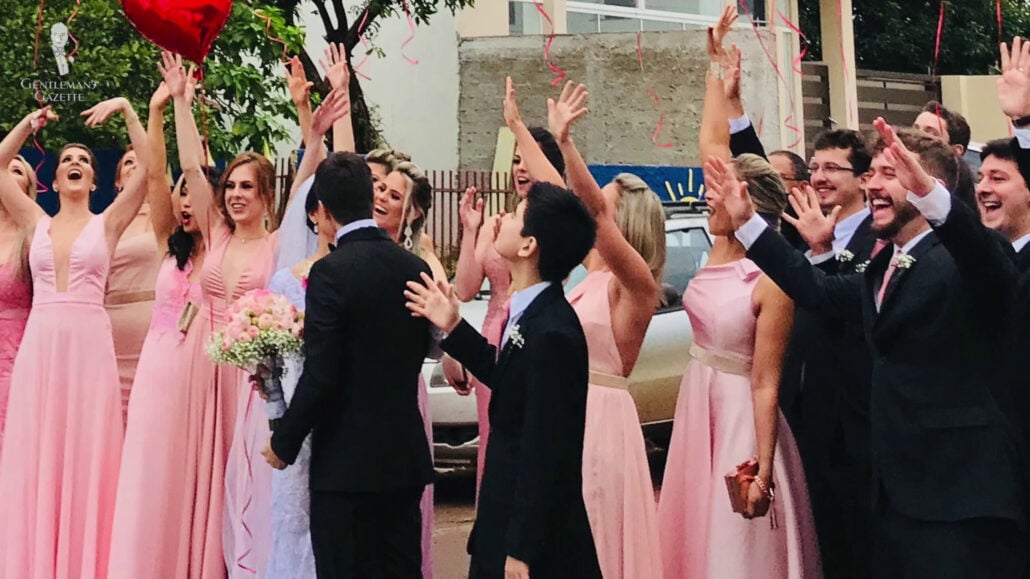Proper etiquette when speaking on the phone is a hallmark of correct gentlemanly conduct, so make sure you’re not accidentally committing any of the ten mistakes that we’re going to cover today.
- 1. Making a Call When It Isn’t Necessary
- 2. Intruding On Others While Speaking
- 3. Offering an Impolite Greeting
- 4. Failing to Introduce Yourself
- 5. Being Distracted
- 6. Unnecessarily Privileging a Call Over a Face-to-Face Conversation
- 7. Speaking in an Unnatural Tone
- 8. Conversing in The Wrong Times & Places
- 9. Not Being Mindful of the Lack of Visual Cues
- 10. Not Leaving a Message
- Conclusion
- Outfit Rundown
1. Making a Call When It Isn’t Necessary
It is becoming increasingly popular to utilize additional forms of communication when contacting others, especially in regard to personal or social communication. With text, email, and even video calls, we have far more options than in the past; therefore, it is more considerate and polite to first determine how to reach out.


For instance, if you’re making an appointment, many businesses now offer online forms. These forms allow you to set up your appointment at your own pace, and this is all done without having to involve the business’s staff.
Conversely, if you’re asking a friend about a meetup later in the week, a short text will allow them to reply at their leisure and provide them with a written record of important details like date and time.

Some may prefer to make
Video Calls
Besides being convenient, some people simply prefer non-telephone conversations. Maybe because they have trouble hearing over a distorted line or because they prefer to see your visual facial cues.
If you notice that someone always replies to your cell phone calls with texts or emails, they might be subtly communicating to you that they prefer those methods of communication.Since being polite is fundamentally about making others feel comfortable and respected, consider adapting to their preferences.
Also, in general, we found that in most cases, before calling someone, especially socially, first send a text briefly outlining what you want to talk about—such as, “Are you free to talk on the phone? I just wanted to discuss our plans this weekend.” This gives the other person time to prepare and ensures that you’re calling at a good time.
2. Intruding On Others While Speaking
Ideally, any phone conversation should stay between you and the person to whom you’re speaking. It is impolite to make others unwilling parties to your call by loudly carrying on with your conversation while others are around. We understand that sometimes this is unavoidable, and that’s okay. But, think of how unpleasant it is to be stuck in a room while the person next to you loudly complains about how expensive their phone bill has become.

Whenever possible, avoid making or taking calls in close proximity to others, as Preston covers in our general guide to conversational etiquette. Doing so is doubly unpleasant when it is on speakerphone.
10 Conversation Mistakes
Ideally, if you have to speak on the phone, leave the confined space to a more open area where you can take the call without disturbing others. If you have to take a call and cannot leave the area, speak in a normal tone and try to resolve the call as quickly as possible so as not to disturb others.
3. Offering an Impolite Greeting
While you can’t shake hands over the phone, you can offer a polite greeting that will set a friendly tone for the rest of the conversation, and you should always avoid a salutation that appears dismissive or distracted.

Answering your phone with a grunt or “Yeah?” is off-putting, and the caller may not even realize that the line is open, leading to frustration and “Can you hear me?” going back and forth. Instead, consider a much more formal and pleasant opening, such as, “This is Kyle Thibodeaux speaking,” to set an amicable tone. Everyone loves a delightful phone manner.
Your precise greeting may vary based on your country, whether you say, “Hola,” or “Pronto,” or “Moshi Moshi.”
Always be sure to say it politely to establish a good rapport. Similarly, when ending the call, offer a brief farewell, and please don’t just hang up. That may be how they do it in the movies, but we are more polite in real life.
4. Failing to Introduce Yourself
In most situations, when you’re telephoning someone else, especially someone that you don’t know or if you’re making business phone calls, the call will naturally present an opportunity to explain who you are and why you are calling.

let the person on the other line
Recognize you
Just like a good introduction in real life, if calling a barber about an appointment, you might say “Hello, my name is Kyle Thibodeaux and I’m calling to make an appointment to have my beard trimmed. No, no, I won’t need a haircut, too.”
Or if you’re telephoning someone socially for the first time, consider something like “Hello, Miss Selena Kyle? This is Kyle Thibodeaux. Our mutual friend Preston gave me your number….”
Taking just a little time to introduce yourself and explain your call provides clarity and a warm reception for the person with whom you’re speaking.
FAQ
Why does proper speaking on the telephone matter?
Conducting yourself properly when speaking on the telephone indicates that you are a polite, professional person with excellent interpersonal skills. Many people find phone conversations trying and having to speak with someone who has a poor telephone manner is identified as many people’s biggest pet peeve.
What is the most appropriate way to answer a phone call?
When answering a phone call, it is polite to greet the caller and introduce yourself. A simple “Hello / Good afternoon / Good morning, (Your Name) speaking” is clear and professional.
Is it necessary to schedule calls in advance?
Whenever possible, scheduling business calls in advance can ensure that both parties are prepared and available for the conversation with a suitable allotment of time resources. However, for more personal or urgent matters, this may not always be feasible.
How can I make sure I’m respecting the caller’s time?
Be mindful of the length of the call. Aim to discuss all necessary topics and keywords efficiently. If you anticipate a longer conversation, ask the caller if they have time to talk or offer to schedule a follow-up.
What should I do if I receive a call at an inconvenient time?
If you receive a call during a meeting or when you’re unable to speak freely, politely explain that you will call back as soon as possible. You might say, “I’m currently in a meeting and cannot talk. May I return your call later?”
How loud should I speak on the telephone?
Speak at a moderate volume. Being too loud can be as problematic as speaking too softly. Adjust your volume based on the sensitivity of your phone’s microphone and the surrounding noise level.
Should I avoid certain topics while on a call?
Yes, refrain from discussing confidential or sensitive topics on the phone unless you’re certain the call is secure. Additionally, avoid controversial or inappropriate subjects in a professional context that might excite emotions. Depending on the formality of the call, you may also wish to avoid using slang terms and overly casual jargon and phrasing.
What is the best way to end a phone call?
Conclude a call with a courteous farewell, summarizing any action items or follow-up steps and a review of key points if applicable.
Is multitasking acceptable during a call?
Multitasking can often lead to distraction and can be perceived as rude. Focus on the call to show respect for the person you’re speaking with and to ensure clear communication. This will allow you to fully appreciate their perspective and any important points that they make.
What should I do if I accidentally interrupt someone during a call?
If you inadvertently interrupt, apologize briefly and allow the other party to continue. For example, “Sorry for interrupting, please go on.”
Can I swear on the telephone?
There are almost no circumstances in which it is a good idea to use curse or swear words while on the telephone. While it is possible to curse like a gentleman, the lack of visual cues and personal proximity can make swearing on the phone always seem overly aggressive.
5. Being Distracted
Just like with an in-person conversation, employ active listening anytime you’re speaking on the phone and provide your undivided attention. Just because the other person can’t see you doesn’t mean you should be augmenting the conversation by watching TV, fiddling with your phone, or even cleaning the house.


6. Unnecessarily Privileging a Call Over a Face-to-Face Conversation
If you’re speaking with someone else and you receive a phone call, don’t immediately drop one conversation for the other. Just like you wouldn’t abruptly stop a conversation to start talking to someone walking by, the fact that someone else is calling doesn’t negate your present conversational obligations.
Instead, politely tell your interlocutor, “Excuse me, my phone is ringing, and I need to check who is calling. One moment, please.” If the call isn’t urgent, let it go to voicemail and say something like, “I’m sorry about that. Where were we?” If the call is urgent, say, “I’m so sorry. I have to take this call. I believe it’s urgent.” And in keeping with rule number two, consider stepping away.

If you’re on the phone with someone and someone enters the room to speak with you, tell the person on the phone something like, “One moment, please. Someone has just come in.” Ask this newcomer how you can help them, and then either conclude or continue your phone conversation as needed. Don’t say, “Sorry, got to go,” and immediately hang up.
Conversely, if you receive a call while on the phone, tell the person with whom you’re speaking, “I’m sorry. I have received a call on the other line. Please let me see who’s calling.”

hang up on the first call
Only if the new call is urgent!
In most cases, you only want to end that first call if the second call is likely to be urgent. Juggling conversational hierarchies can be tough, but you should always endeavor to treat everyone that’s involved as politely and equitably as possible.
7. Speaking in an Unnatural Tone
Yelling to be heard in real life rarely makes you more comprehensible. And the same is doubly true for telephone calls. If someone is having trouble hearing you over the phone, either due to a bad connection or auditory issues, speaking slowly and clearly is almost always your best option.
If the connection is especially poor, you should instead say, “I’m sorry. We have a very bad connection. Please let me call you back to see if that fixes it.” Rather than trying to shout over the static. If you’re in an area with poor reception, like inside a tunnel underground or in a tiled room, you may need to say, let the person on the other line know.

As you might expect, speaking in an unnaturally low tone will make it harder to hear, and you usually only feel the need to do that if you’re breaking our next rule.
8. Conversing in The Wrong Times & Places
There are some places where you obviously shouldn’t carry on a phone conversation. These include entertainment venues like cinemas, concerts, and theaters; solemn occasions like funerals, ceremonies like weddings or graduations, and similar events where your full attention should be focused elsewhere and you shouldn’t be creating distractions for others.




If possible, in these circumstances, we suggest completely turning your phone off or turning it to silent, ideally before entering the venue, to avoid any distractions. But we understand that sometimes you have responsibilities that make it difficult to cut yourself off from other communication completely.
In such cases, we recommend that you set your phone to vibrate, store it in your pocket, and when you feel it start to vibrate, quickly excuse yourself to go somewhere more private. Avoid the temptation to immediately answer the phone or even to check your phone screen in dark environments because the light shining in the dark could distract others.

There are also less obvious situations in which you should avoid carrying on a phone conversation; of course, unless it’s an emergency. These include when you’re a guest at someone else’s home, when you’re entertaining or being entertained, while dining, while transacting business, like placing an order for coffee, or any situation in which you should be paying attention to a human being in front of you.

avoid distractions and
Respect the person present
If you need to take a call, politely excuse yourself and try to resolve the issue as quickly as possible. If people have taken the time to meet you in person, you should respect their time and attention as much as is feasible.
9. Not Being Mindful of the Lack of Visual Cues
When speaking on the phone be aware of the fact that you don’t have the same visual cues when not speaking on the phone. You won’t be able to see the way people lift or turn their heads, raise their hands, shift their mouths, or alter their eyes, all of which are subtle ways to show that they have something to say or more to say.

Therefore, when speaking on the phone, it is polite to intentionally slow down your pace of speech and provide plenty of brief pauses. This gives the other person opportunities to chime in and will make it less likely that you’ll inadvertently dominate the conversation or interrupt.
10. Not Leaving a Message
It’s polite to indicate in some way why you were calling if you miss the person you called. When someone only sees that they’ve missed a call, they don’t know if the call was about something important or urgent, which can create unnecessary confusion and anxiety.
This doesn’t mean that you have to leave a voicemail. Text messages work, too. You could indicate something like, “Sorry I missed you. I was calling about our summer plans,” or if necessary, “Please call me back urgently. This is about Great Aunt Helga’s health.”

when leaving a voicemail,
Keep it concise.
When leaving a message don’t make it overly long, especially not if it’s a voicemail. Provide critical information only, your name, a very brief explanation of the purpose of the call, your call back number, and convenient times to call you back if necessary. Ideally, it should be no longer than 20 to 30 seconds.
Offering this simple context will quickly convey the nature of the missed call so the person you’re trying to reach is better able to assist with what you need.
Conclusion
As with all matters of politeness, the main lesson about proper etiquette when speaking on the phone is simply about being considerate to others, especially in formal or serious situations.
What tips do you employ for superlative telephone conversations, or have you ever been privy to examples of phone-speaking etiquette that are especially poor? Let us know in the comments.
Outfit Rundown
Today, I’m wearing a blue houndstooth blazer with a blue button-up shirt, blue pants with brown dress shoes, and Fort Belvedere pocket square and socks. My fragrance is the 4 Rosso from Roberto Ugolini.

For amazing fragrances and other pocket squares, socks, and other great accessories, check out the Fort Belvedere shop.





My biggest complaint about people on the phone is that they talk way too fast and must repeat everything. If they had spoken slowly and succinctly the first time, they would have finished the phone call in half the time.
Relevant topic. Good article.
I don’t understand why people on their cell phone want other people to hear their conversation. When I was at work and have an important call, I would duck underneath my desk so no one could hear my conversation.
I have wasted a lot of time listening to messages left to understand the telephone number that was I was to call back. I have had to listen several times to understand the telephone number that was left to call back at the end of the message because the person rapidly left the telephone number! Wasted time listening to message to get the correct number. A good technique is to leave your telephone number at the beginning of the message.
As an aside. I don’t understand why recently, when you thank someone, the response is “no problem.” My response is “who said it was a problem?”